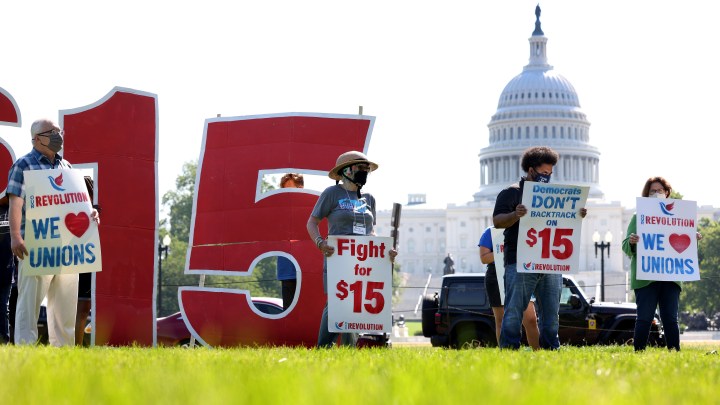
Many states and cities to raise minimum wage in the New Year
Many states and cities to raise minimum wage in the New Year

A record number of states and cities plan to raise their minimum wage in the coming year, according to a report by the National Employment Law Project.
At the start of 2022, more than 50 jurisdictions are scheduled to raise their minimum wage rates, many to $15 an hour or more.
The moves come as efforts to raise the federal minimum wage for the first time in more than a decade have all but fizzled. Still, employers are raising wages anyway.
A labor-backed campaign — the Fight for $15 — has been advocating for higher pay for nearly a decade, and Americans across the political spectrum have increasingly supported these policies in recent years, as wages largely stagnated.
But now things are looking different, said economist Michael Strain at the American Enterprise Institute.
“The really rapid wage gains that we’ve seen in 2021 will affect how much of a bite, you know, a $15 an hour minimum wage has or a $12 an hour minimum wage has,” he said.
Average wages were up almost 5% in November. The increase was even higher in some industries, like leisure and hospitality, which saw wages grow almost 14% compared to a year ago.
So bumping up the minimum wage by a dollar or two? “Frankly, I think a lot of establishments have already started offering wages similar to that,” said Brian Asquith, an economist at the W.E. Upjohn Institute for Employment Research.
Businesses typically decrease hours, hire fewer workers or raise prices when minimum wages go up, Asquith added. But a tight labor market means employers might not feel the change any more than they already are.
Plus, fast-rising inflation means workers might not feel the benefits either, according to Molly Kinder, a fellow at the Brookings Institution.
“In order to have the same purchasing power as $15 a year ago, you need to make over $16 now,” she said.
About one-third of states tie minimum wage increases to cost of living, but others don’t take inflation into account.
There’s a lot happening in the world. Through it all, Marketplace is here for you.
You rely on Marketplace to break down the world’s events and tell you how it affects you in a fact-based, approachable way. We rely on your financial support to keep making that possible.
Your donation today powers the independent journalism that you rely on. For just $5/month, you can help sustain Marketplace so we can keep reporting on the things that matter to you.

















